-
An Introduction to Electrical Hazards
Introduction to Electrical Hazards
In our modern world, electricity is a fundamental part of daily life, powering homes, businesses, and industries. However, with its widespread use comes the potential for electrical hazards, which can cause significant harm if not properly managed. Understanding these hazards is important for everyone, from homeowners to industry professionals. In this article, we’ll discuss electrical hazards, how to identify them, and actions to eliminate them.
What are Electrical Hazards?
Electrical hazards are potential sources of injury or damage associated with the use of electricity. They include a wide range of risks, from electric shocks to electrical fires, and can result in severe property damage, injuries, or even fatalities.
Why It’s Important to Know About Electrical Hazards
Awareness of electrical hazards is key to preventing accidents. Understanding the risks associated with electrical systems helps individuals and professionals implement safety measures and practices to protect themselves, others, and their property. This knowledge is particularly critical in workplaces where employees regularly interact with electrical equipment.
Causes of Electrical Hazards
Electrical hazards can stem from a number of sources:
- Faulty Wiring and Equipment – Improper wiring, aging electrical infrastructure, and malfunctioning equipment can lead to dangerous situations.
- Overloading Circuits – Overloading power outlets and circuits can cause overheating and potentially start a fire.
- Lack of Grounding – Inadequately grounded electrical system increases the risk of electric shock.
- Exposure to Water – Electricity and water are a dangerous combination, heightening the risk of electric shock.
- Improper Installation or Maintenance – Electrical systems that are not properly installed or maintained can quickly become hazardous.
What Are Common Electrical Hazards?
There are five main types of electrical hazards:
- Electric Shock – Electric shocks can occur when the human body comes into contact with an electrical energy source.
- Arc Flashes and Blasts – These are intense and sudden releases of electrical energy into the air.
- Electrical Fires – These can be caused by overheated wires, equipment failures, or improper electrical installations.
- Electrocution – In high-voltage situations, fatal electric shocks can occur.
- Power Surges – Unexpected increases in electrical power can damage equipment and pose fire risks.
What Safety Standards Apply to Electrical Hazards?
Several safety standards and guidelines help to mitigate electrical hazards:
- National Electrical Code (NEC) – The NEC offers guideline for safe electrical installation and maintenance.
- Occupational Safety and Health Administration (OSHA) – OSHA sets standards for electrical safety in the workplace.
- International Electromechanical Commission (IEC) – This body provides international standards for electrical technologies and safety.
- Local Building Codes – Most jurisdictions incorporate NEC guidelines and may have additional requirements.
Contact Delta Electric for All of Your Electrical Work
Delta Electric, with its rich history and extensive expertise in electrical safety, is ready to help you to recognize electrical hazards and safely deal with them. Our commitment is to be more than just service providers. We aim to be educators and partners with you to avoid electrical hazards. By choosing Delta Electric, you are not just ensuring the safe operation of your electrical systems, you are also investing in the long-term safety and efficiency of your property.
Our professional team, armed with the latest tools, knowledge, and technology, is dedicated to delivering service that meets the highest standard of quality and safety Whether it’s conducting a routine inspection, offering tailored solutions, or providing emergency services, we are equipped to address all of your electrical needs.
Don’t let electrical hazards put your safety at risk. Reach out to us by completing our contact form or by calling us to speak to a member of our team. Gain the peace of mind that all is well with your electrical system.
Delta Electric is a fully licensed and insured electrical contractor that has served the San Jose, CA, area since 1982. Specializing in a range of services for residential, mobile, and commercial properties, we offer expert solutions for electrical installations and repairs. Our offerings include custom lighting, panel upgrades, remodeling, wiring, safety inspections, grounding, and much more. As a local, family owned and operated business, we pride ourselves on our community connections. We aim to deliver top-notch service, backed up by over three decades of experience in the electrical industry. We provide free estimates, reasonable rates with no hidden fees, 24 hour emergency services, along with a commitment to quality.
For more information about the products and services we provide, or to request service or a free estimate, contact us today via our website or give us a call at 408-495-2031. We look forward to serving you!
-
Questions to Ask Your Electrician About Your Remodeling Project
Home renovations serving San Jose make your house more valuable to you and anyone who might purchase it in the future if you decide to sell. You have to be careful when you renovate though, because you don’t want to mess with your electrical system without the help of your electrician. It might be the right time to upgrade your electrical panel when you remodel, and depending on how extensive your renovations are, you might need to decide where to put your outlets. Never work with a sketchy electrical contractor, and avoid doing so by asking for references. Here’s a look at the questions you should ask your electrician about your remodeling project.
Should I upgrade my electrical panel?
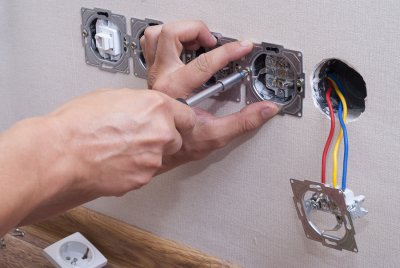
If you’re renovating your home because it was built a long time ago and you need to bring it into modern times, then this is the time to upgrade your electrical panel, as well. Older electrical panels aren’t as reliable or efficient as current models, so you could be wasting electricity without even knowing it. What’s more, malfunctioning models pose a threat to your safety. If you’re in the planning phase of remodeling, talk to your electrician and see if you should upgrade your electrical panel.
Where should my outlets be?
It’s aggravating when electrical outlets are located in inconvenient spots, and it’s even worse when your wire falls just short of reaching where it needs to reach. When you remodel your house, consult your electrician to see if you should add new outlets and where you should put them.
Do you have references?
You should ask the right questions about your remodeling project itself to make sure you’re on the same page with your electrician, but you should also ask questions about the electrician. References from past jobs can vouch for the quality of the electrician’s work, and these people are likely to be honest about their experiences. Don’t be afraid to ask your electrician about his or her experience, as these questions will help you choose the one that will help you through your remodeling project.
-
Spotlight on the Role of the Electrician in Your Home Remodel
There is a lot to think about when it comes to home renovations, and among the most important of these is the electrical system. Depending on the project, your home’s wiring may need to be addressed to account for the structural changes or new construction. For this reason, it’s important that you consult a home remodeling electrician in San Jose and learn what modifications or upgrades will need to be made to your electrical system. Also, by addressing the electrical aspects of the project early on, you can avoid having to make costly or time-consuming changes after beginning the remodel.
An electrician will be able to assist you with the electrical aspects of just about any home remodeling project, such as those for bathrooms, kitchens, basements, offices, dens, and room additions. Also, your electrician will be able to address everything from adding new circuits to rewiring your new home. Lastly, because electrical work should not be completed by inexperienced individuals, remember that upgrades like these should be left to the professionals.
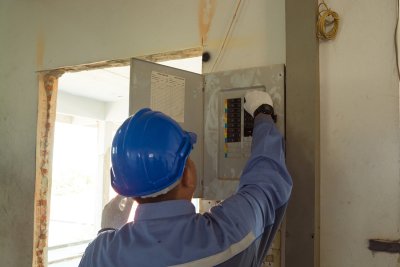
-
What to Look for in an Electrician for Your Home Remodel
During a home remodeling project, you may find that you need to replace your electrical panel, electrical wiring, or household lighting system. Rather than attempting to perform major electrical services on your own, always hire a qualified electrician to assist you with your electrical renovations . A residential electrician in San Jose will be able to provide you with safe and effective renovations for your household’s electrical system. Let’s review some elements that you should look for when you are hiring an electrician to work on your home.
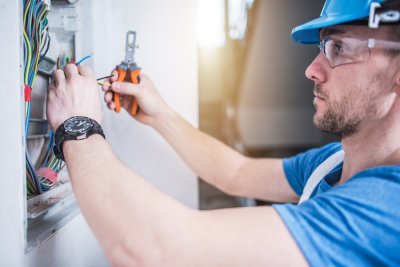
Professional Qualifications
In order to become a licensed electrical contractor, an electrician must complete a rigorous training program. Depending on the level of education that an electrician has completed, he may be classified as a master electrician or a journeyman electrician. To ensure that you have a skilled professional working on your home’s electrical system, always seek out a master electrician to perform your repairs. The level of master electrician is the highest level of qualification that can be achieved by an electrical contractor.
Licensing and Insurance
A reputable electrician will be fully licensed and insured by the city and state. Many states have comprehensive licensing programs, which require electricians to be up to date with their tools, materials, and methods. Before you hire an electrician to work on your remodeling project, you can ask to see a copy of his current licensing and insurance documents.
Remodeling Expertise
While some electricians specialize in new home constructions or emergency repairs, others are uniquely qualified to perform residential electrical remodels. When you are gearing up for a remodeling project for your home, seek out an electrician that has specific expertise in the remodeling industry. Your remodeling expert will know how to safely replace your home’s wiring, check your current circuits, and evaluate the need for additional panels or GFCI circuits throughout the home. By working with a remodeling expert, you can rest assured that your electrical system is ready to support your newly renovated home.
-
Why Old Electrical Panels Can Be Hazardous
When you move into an older home, one of the first actions that you will want to take is to schedule an electrical inspection with a residential electrician in San Jose . During your inspection, your electrician will check the old electrical panel or breaker box to make sure that it is in serviceable condition. Older electrical panels can create significant safety hazards in the home. Let’s review three reasons why old electrical panels can be hazardous to your family and property.
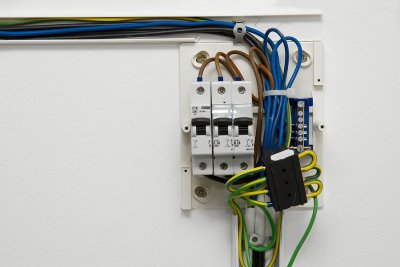
Insufficient Electrical Current
The electrical panel is responsible for delivering electrical current to the various outlets around your home. If your electrical panel is old and outdated, it may not be able to put out a sufficient amount of electrical current to your various outlets. Without the correct amount of electricity, your outlets and appliances could easily become overloaded. Alternatively, you may find that you must resort to using numerous extension cords or plug-in strips to make up for your circuit panel’s lack of electrical current.
Overloaded Electrical Wiring
When your home’s electrical system experiences a surge of electricity, your electrical panel should automatically shut off your circuits. As electrical panels age, however, they may no longer be able to flip their circuits. Since your electrical panel will have no way of warning you when it has ceased to function, you may experience a dangerous overload during the next power outage or other electrical emergency.
Electrical Fires
Another serious danger that is associated with older electrical panels is the risk of electrical fires. When electrical panels get overloaded with electrical current, they may be at risk of bursting into flames. Electrical fires are among the most common causes of serious household fires in the United States. If you want to make sure that your household is protected from the dangers of an electrical fire, be sure to have your older electrical panel inspected by a licensed and certified electrician. When your electrician finds that your panel is outdated, it will be time to schedule a replacement.
-
These Signs Mean You Should Call an Electrician About Rewiring
Problems with your electrical wiring in San Jose can present quite a few hazards, but how do you tell if you’re at risk? In addition to having your residential or commercial electrician check out your system, there are some signs that you can look for. If you know that your electrical wiring was done a long time ago, you should keep a closer eye out for problems. You might also need to replace your electrical wiring if your panels are malfunctioning or if your outlets aren’t receiving enough power. Learn more about these signs by reading ahead.
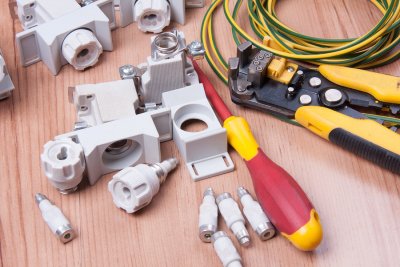
Old Wiring
The older your building is, the more likely it is to contain old wiring. This type of wiring is more prone to malfunctions, which can cause unnecessary danger for your home or office. If you frequently deal with electrical problems—even minor ones—you might have old wiring. In this case it’s a good idea to consider the benefits of rewiring. Your electrician can completely rewire your system, which will make it more efficient and safer for your family or patrons.
Dangerous Electrical Panels
Your electrical panel is full of fuses, and they control the amount of electricity that enters your home or business. If too much comes through at once, a fuse will trip and the electricity will be cut off. This helps keep you safe, but only if it works properly. Rewiring will help to make your electrical panels safer and more effective. This minimizes the chances of accidents and injuries, and it can boost the efficiency of your electrical system.
Lack of Power to Outlets
When you plug an appliance in and push the power button, you should expect it to turn on. If it doesn’t, you might think there’s something wrong with the appliance, or you might check the electrical panel to see if you blew a fuse. While both are possible culprits, the problem could also be your wiring. If it turns out that your appliance works when plugged into a different outlet, and the fuse wasn’t blown, then consider electrical rewiring to bring power back.
-
What to Know About Arc Fault Breakers
Since most of a typical home’s electrical system is out of sight, most homeowners do not understand how complex or sophisticated it truly is. For example, one big aspect of the modern home electrical system is the arc fault breaker, also known as an arc fault circuit interrupter. This piece of technology is vital for protecting your home from electrical fires.
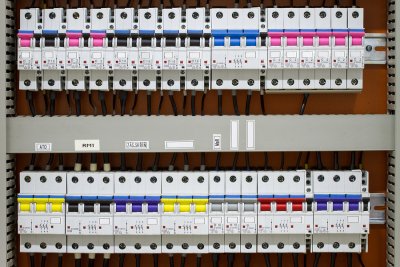
Importance
To understand the importance of arc fault breakers, it’s important to understand the concept of arc faults. Simply put, an arc fault is when an arc, or electrical discharge, flows through an unplanned path. As you can imagine, this could lead to some pretty dangerous circumstances—including an electrical fire. An arc fault breaker is designed to detect arc faults and protect the circuit, thereby reducing the risk of an electrical fire, of which there are more than 40,000 a year in the U.S.
Basic Function
The average arc fault breaker is very sophisticated, and uses advanced technology to detect various types of arcing. Normal arcing occurs all the time when electrical appliances are turned on—these require no special action from the arc fault breaker. When an arc fault occurs, however, the arc fault breaker instantly recognizes the fault and interrupts the circuit, thereby reducing the danger. By contrast, conventional circuit breakers are only equipped to respond to overloads and short circuits. Arc fault breakers are now required by law for circuits feeding into electrical outlets in most rooms.
Nuisance Tripping
Though arc fault breakers are vital for safety, there are times when they overreact. In other words, an arc fault breaker may interrupt a circuit even when an appliance is being used safely and properly. This is called “nuisance tripping.” This occurs most commonly with older electrical tools and appliances that have motors with brushes. Vacuums and power drills are two such appliances. If your breaker frequently engages in nuisance tripping, have an electrician take a look and address the problem. You should know that arc fault breakers are being improved on all the time.
RECENT POSTS
categories
- Uncategorized
- Delta Electric
- Commercial Electrical
- Residential Electrical
- Electric Circuits
- Dedicated Circuits
- Circuit Breakers
- Electrical Panels
- Electrical Wiring
- Safety Inspections
- copper wires
- Electrician San Jose
- Trained Electricians
- Electrical Services San Jose
- Malfunctioning Electrical Outlets
- Circuit Breaker
- Grounding
- safety
- Flickering Lights
- Arc Fault Breakers
- electrical system
- Aluminum Wiring
- Circuit Interrupters
- House Surge Protection
- Zinsco Panel Warnings
- Wiring Conversion
- GFCI outlet
- professional electrician
- Knob-and-Tube Wiring
- modern home electrical system
- Fuses
Archives
2024
2023
2018
2017
- December (4)
- November (4)
- October (5)
- September (4)
- August (4)
- July (4)
- June (4)
- May (4)
- April (4)
- March (3)
- February (4)
- January (3)
2016
- December (3)
- November (4)
- October (4)
- September (4)
- August (4)
- July (4)
- June (4)
- May (4)
- April (4)
- March (4)
- February (4)
- January (4)
2015
- December (4)
- November (4)
- October (4)
- September (4)
- August (3)
- July (4)
- June (4)
- May (3)
- April (4)
- March (4)
- February (2)
2014
- December (3)
- November (4)
- October (4)
- September (6)
- August (2)
- July (3)
- May (2)
- April (1)
- March (2)
- February (1)
- January (1)

